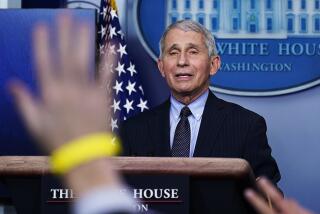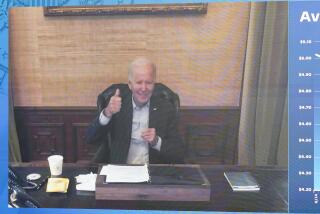Texas Ebola patient on respirator ‘fighting for his life’
Reporting from Dallas — The first Ebola patient diagnosed on U.S. soil took a turn for the worse Sunday, with officials saying Thomas Eric Duncan was on a respirator fighting for his life.
A senior federal health official familiar with his condition said Duncan “could die quickly,” but did not rule out the possibility that the Liberian could rally and survive.
Roughly 50 people who may have had contact with Duncan before he was hospitalized a week ago continued to wait under close monitoring to see if they, too, would become ill.
The federal government’s top infectious-disease expert, Dr. Anthony S. Fauci of the National Institutes of Health, told “Fox News Sunday” that “I would not be surprised … if someone who had very close contact with Mr. Duncan actually comes down with Ebola.”
Fauci spoke as authorities announced that a homeless person who may have had some kind of contact with Duncan briefly went missing -- prompting an unusual medical manhunt. Authorities later reported that the person had been found.
Duncan, the Liberian who was the first person in the United States to be diagnosed with the virus thought to have killed more than 3,400 people in West Africa, was in critical condition Sunday at Texas Health Presbyterian Hospital.
So far, none of the 114 people initially thought to have possibly come into contact with Duncan have developed Ebola symptoms. That includes the seven medical personnel who came in close contact with Duncan or his fluids before he was diagnosed, and the four people Duncan was staying with in Dallas after traveling to the U.S. from Liberia.
A brief, new Ebola scare at Newark Liberty International Airport, where an international passenger arrived vomiting Saturday, turned out to be a false alarm. The passenger was released in good condition.
In Texas, about 50 people remain under medical surveillance, with daily temperature checks that could signal the arrival of Ebola symptoms, which would mean the disease could be transmitted to others through bodily fluids.
Youngor Jallah, 35, was among the last people to see Duncan before he was placed in isolation at a local hospital. Duncan is her mother’s boyfriend. When Duncan became ill after arriving in Dallas, it was Jallah, a nursing home worker, who helped care for him.
On Sunday, Jallah and her family were home, where they have been advised to stay, watching the news and tracking Duncan’s condition.
“We just pray he is OK,” Jallah said.
Shortly before 1 p.m., a pair of public health workers stopped by to check the family’s temperatures and monitor their conditions. All said they remained healthy and had no symptoms.
Officials briefly encountered a minor scare when one of the dozens of people they were monitoring, a homeless person who might have had contact with Duncan, went missing, officials revealed at a Sunday news conference.
The unidentified person -- whose name, age and contact with Duncan were not disclosed -- was considered at low risk for contracting the virus after officials took his temperature Saturday, officials said.
The missing homeless person -- it was not clear whether he was an adult or a juvenile -- was told to stay where he was, but “he left,” said Dr. David Lakey, commissioner of the Texas Department of State Health Services, during a Sunday news conference.
Judge Clay Jenkins, the top elected official in Dallas County, said local law enforcement and first responders were putting “boots on the ground” to find the person, and, addressing him through the media, urged him to be “a hero for his community by letting us help him.”
Within hours of the news conference on Sunday, the unidentified male had been found and was being monitored, Jenkins tweeted.
Meanwhile, the four people considered most at risk for contracting Ebola after staying with Duncan in Dallas remained secluded in an undisclosed location where at least one young man in the group was enjoying playing basketball, Jenkins said.
Louise Troh -- described by Jallah as Duncan’s girlfriend -- was moved to the undisclosed Dallas residence Friday by city and county officials, along with her 13-year-old son, Timothy Wayne, friend Jeffrey Cole, 22, and a relative of Duncan’s, Oliver Smallwood, 28.
Jallah said the new place where officials took Troh to stay doesn’t have the pots and pans she is used to, so Troh has had trouble cooking, which has added to her stress.
“I think her [blood] pressure’s going up,” Jallah said.
Jenkins, the county judge, said the decision not to keep the isolated four inside a hospital was made out of concern that local residents would stop going to that hospital, potentially creating an even greater health problem than the unlikely possibility of an Ebola outbreak in the U.S.
Officials have been ramping up their efforts across the U.S. and in West Africa to prevent further spread of the disease, with Fauci of the NIH, along with Dr. Tom Frieden, head of the CDC, appearing on four Sunday TV talk shows to discuss prevention efforts.
The two stressed that U.S. health authorities are taking aggressive steps to prevent an outbreak here even if another case appears.
“It’s really understandable that people are scared. It’s a deadly virus,” Frieden said on NBC’s “Meet the Press.”
“The bottom line here is we know how to stop it,” he said. “It’s not going to spread widely in the U.S., for two basic reasons: We can do infection control in hospitals and we can do public health interventions that stop it in its tracks.”
U.S. officials say more than 100 people have reported fevers and other Ebola-like symptoms here since the epidemic began in West Africa. But Duncan is the only confirmed Ebola case diagnosed on U.S. soil.
Although Fauci, director of the NIH’s National Institute of Allergy and Infectious Diseases, said he wouldn’t be surprised if Duncan had transmitted the virus, he added: “The encouraging thing about that is that person, that small group of [at] risk people, are being very closely monitored and if in fact they start to develop symptoms, they’ll be put under the circumstance of not being able to spread it [to] other people,” he said.
Experts said Ebola patients are contagious only once they are displaying symptoms, including a fever above 101.5 degrees, severe headaches, muscle pain, diarrhea and vomiting.
“Here in the U.S., I remain quite confident we will not have a widespread outbreak,” Frieden said.
President Obama is briefed about Ebola every day, White House senior advisor Dan Pfeiffer said on “Meet the Press.”
“It’s important people understand that this outbreak has been happening for seven months in West Africa and this is the first time someone has come to the United States” and been diagnosed here with the disease, he said.
“I think we are going to look and make sure everything is working, and if we see where there are flaws in the system where things don’t work, we’ll address those,” Pfeiffer said. “But we’re very confident in the procedures we have in place.”
Those procedures do not include travel restrictions to and from West Africa.
Frieden said U.S. officials believe that could be counterproductive because they fear such a move could impede the fight against the virus in West Africa and trigger further spread, which would pose a greater risk of an outbreak in the U.S.
“We have to recognize that, try as we might, until the outbreak is controlled in Africa, we can’t get the risk here to zero,” Frieden said on “This Week with George Stephanopoulos.”
In other developments, a freelance cameraman for NBC News was expected to arrive in Omaha, Neb., on Monday for treatment after contracting Ebola in West Africa. Ashoka Mukpo left Liberia on Sunday in “good spirits,” according to NBC, and was eating and drinking on his own.
Also Monday, Texas Gov. Rick Perry was expected to announce “a new initiative in statewide preparedness and response to pandemic disease.”
Hennessy-Fiske reported from Dallas, Puzzanghera from Washington and Pearce from Los Angeles. Staff writer David Willman in Washington contributed to this report.
More to Read
Sign up for Essential California
The most important California stories and recommendations in your inbox every morning.
You may occasionally receive promotional content from the Los Angeles Times.













